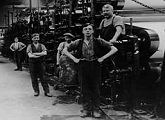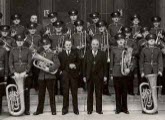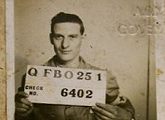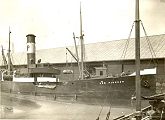Railway history: 200 years of the steam locomotive
Nostalgia for the Age of Steam is part of our national character: the sight and sound of a steam locomotive has the power to stir strong feelings. Poems such as Edward Thomas's Adlestrop and W. H. Auden's Night Mail join with books such as The Railway Children and films like Brief Encounter to reflect and reinforce these emotions.
June 2004 saw the launch of Railfest 2004, a wide variety of events commemorating the 200th anniversary of the first steam locomotive to run on rails, at Pen Y Darren Ironworks near Merthyr Tydfil, Wales, with a locomotive constructed by the Cornish engineer Richard Trevithick (1771-1833). The world's first regular railway passenger service also began in Wales, in 1807. Railfest 2004 was a celebration of train travel and railway heritage across the UK.
The collections described in the Archives Hub include papers of inventors and engineers, records of locomotive manufacturers, railway companies and railway workers' unions, and papers of writers who had a special enthusiasm for railways and steam engines. And along with the steam train, we even take a ride on the Undulating Railway and the Railplane as well.
We also include links to websites of archives and museums relating to railways and train travel, and to heritage railways, and some suggested reading.
Collection descriptions
Inventors, railway engineers, and locomotive manufacturers
- James Watt (1736-1819): collection relating to the inventor, engineer, and steam engine manufacturer
- Proposed London to Porth Dinllaen Railway: report by civil engineer Charles B. Vignoles (1793-1875)
- Isambard Kingdom Brunel (1806-1859): chief engineer of the Great Western Railway
- Richard Badnall (died 1842): co-inventor of the 'undulating railway'
Railway companies
- Mumbles Railway: the first regular rail passenger service in the world, 1807
- Early railways in Britain: includes photographs of steam locomotives
- Railway Acts (1826-1923): legislation relating to railway companies, in particular the Liverpool & Manchester Railway
- Shiell and Small, Solicitors (1832-1990): includes records of Scottish railway companies
Railway workers' unions
- Amalgamated Society of Railway Servants of England, Ireland, Scotland and Wales: founded in 1872
- Amalgamated Society of Vehicle Builders, Wheelwrights Carpenters and Mechanics: founded in 1873
- Aslef (Associated Society of Locomotive Engineers and Firemen): formed in 1880
- General Railway Workers' Union: founded in 1890; amalgamated with others to form the National Union of Railwaymen (NUR) in 1913
- Transport Salaried Staffs' Association: formed as the National Association of General Railway Clerks in 1897
- National Union of Railwaymen (NUR): formed in 1913 as the amalgamation of several unions; itself amalgamated with others to form the National Union of Rail, Maritime and Transport Workers (RMT) in 1990
Railway-mad writers
- Thomas Sopwith (1803-1879): mining engineer who kept diaries of his travel by rail
- Edward Thomas (1878-1917): poet and author of Adlestrop, 1900, inspired by a railway journey and the railway station in Gloucestershire.
- W.H. Auden (1907-1973): author of Night Mail, a poem as commentary for the 1936 documentary film about the London Midland and Scottish Railway's mail train.
- Canon B.S.T. Simpson (born 1912): correspondence on railways with Reverend W Awdry (1911-1997), creator of the Thomas the Tank Engine stories for children about railway engines.
Suggested reading
Links are provided to records on Copac for these items. The Copac library catalogue gives free access to the merged online catalogues of major University, Specialist, and National Libraries in the UK and Ireland, including the British Library. For more information about accessing items see the FAQs on the Copac website.
- Ian Allan (1969) London Transport Locomotives and Rolling Stock : Records on Copac
- Paul Catchpole (2002) Britain's World of Steam : Records on Copac
- Colin Garratt and Max Wade-Matthews (2006) Locomotives: a complete history of the world's great locomotives and fabulous train journeys : Records on Copac
- Nigel S.C. Macmillan (1992) Locomotive Apprentice: At the North British Locomotive Company : Records on Copac
- Martin Malia, edited and with a foreword by Terence Emmons (2006) History's locomotives: revolutions and the making of the modern world : Records on Copac
- Eric Robinson and A. E. Musson (1969) James Watt and the Steam Revolution : Records on Copac
- Peter Waller and Alan C. Butcher (2008) Locomotives from the National Collection [photographs of the National Railway Museum in York] : Records on Copac
- Christian Wolmar (2007) Fire and Steam: A New History of the Railways in Britain : Records on Copac
Related links
Railway history in archives collections
- Brunel Collection (University of Bristol)
- Railways: An Overview: records relating to railways held at the National Archives
- Scottish Railways: research guide (Glasgow University Archive Services) [PDF file - requires the free Acrobat reader]
- Railway Archive: The Last Main Line: history of the Great Central Railway's 'London Extension'
- North By Northwest: images of Scotland's Highland Railway (Scottish Archive Network)
- National Sound Archive: includes several hundred recordings of railway sounds
Railway museums and vintage trains
- National Railway Museum: the largest railway museum in the world (York)
- UK Heritage Railways: although the Age of Steam is now a part of history, there are many railway preservation centres where you can still enjoy a ride by steam train.
- Steam Underground 1863-1905 (London Transport Museum)
- Stephenson Railway Museum (North Shields)
- Steam: Museum of the Great Western Railway (Swindon)
- Birmingham Railway Museum
- Narrow Gauge Railway Museum (Talyllyn, Gwynedd)
- Ulster Folk and Transport Museum: Irish railways
Studying the history of railways
- Institute of Railway Studies and Transport History (University of York)
- Railways in the 19th century (Spartacus Schoolnet)
You can receive regular updates on our special features by joining our mailing list.











